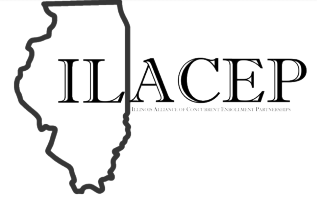Programs of Study
The Strengthening Career and Technical Education for the 21st Century Act, section 3 (41)(A), defines a program of study as a coordinated, non-duplicative sequence of academic and technical content at the secondary and postsecondary level that-
- incorporates challenging State academic standards, including those adopted by a State under section 1111(b)(1) of the Elementary and Secondary Education Act (ESSA) of 1965;
- addresses both academic and technical knowledge and skills, including employability skills;
- is aligned with the needs of industries in the economy of the State, region, Tribal community, or local area;
- progresses in specificity (beginning with all aspects of an industry or career cluster and leading to more occupation-specific instruction);
- has multiple entry and exit points that incorporate credentialing; and,
- culminates in the attainment of a recognized postsecondary credential.
The State of Illinois is dedicated to ensuring that all students have access to rigorous and relevant educational opportunities that prepares them for success in college and careers. In order to achieve this goal, all Illinois educational systems must work collectively and collaboratively to create an aligned educational structure that improves student learning. Career and Technical Education (CTE) programs, which combine challenging academic coursework with relevant, career-focused content, are uniquely positioned to respond to this challenge.
Resources:
Working Stronger and Smarter: A handbook on theory and techniques for developing employability skills for technicians.
POS Models
Model Programs of Study Guides and Resources can be found below!
Information Technology:
Model Programs of Study Guide – Information Technology
Model Programs of Study Visualization – Information Technology
Manufacturing and Engineering:
Model Programs of Study Guide – Manufacturing and Engineering
Model Programs of Study Visualization – Manufacturing and Engineering
Education:
Model Programs of Study Guide – Education
Model Programs of Study Visualization – Education
Health Sciences and Technology:
Model Programs of Study Guide – Health Sciences and Technology
Model Programs of Study Visualization – Health Sciences and Technology
Approval Form
Dual Credit
What is Dual Credit?
Dual credit is an instructional arrangement where an academically qualified high school student enrolls in a college-level course and, upon successful course completion, concurrently earns both college credit and high school credit. Dual Credit is governed by ICCB Administrative Rules (section 1501.507-11) and the Dual Credit Quality Act.
What is the impact on educational providers?
Dual credit provides highly motivated and academically qualified high school students early college credit opportunities, maximizes state and local educational resources, and provides a platform that fosters secondary and postsecondary collaboration and interdependence. By aligning program content and reducing curricular duplication, dual credit impacts the way educators, students and institutions connect. It builds on the cooperation developed through previous articulation structures and raises interaction to a higher level. Secondary-to-postsecondary program linkages are strengthened and what develops is a truly seamless program that engages faculty at both levels in the structuring, planning, and teaching of a truly integrated program of study.
Dual Credit Administrative Rules
Dual Credit Endorsement for High School Teachers – A Dual Credit Endorsement, as designated in 110 ILCS 27/Dual Credit Quality Act, is an endorsement valid for grades 11-12 to be placed on the Professional Educator License (PEL) at the request of an instructor who meets the appropriate credential standards.
Dual Enrollment – An academically qualified student who is still enrolled in high school also enrolls in a college level course at the community college. Upon successful course completion the student exclusively earns college credit. No high school credits are earned.
Model Partnership Agreement (default agreement)
Based upon mandates in Section 16 of the Dual Credit Quality Act (DCQA), the Illinois Community College Board and the Illinois State Board of Education was charged to establish a committee to develop a Model Partnership Agreement (MPA) to serve as a default agreement for local high schools and community colleges as they negotiate dual credit arrangements for students. These MPA provisions are made available in the event that local agreement between a school district and community college cannot be reached. Furthermore, the agreement may be modified / utilized to help formulate existing agreements, and specific portions of the agreement may be used in the event of issue-specific impasses. Community Colleges are still encouraged to continue to develop their own local agreements with their local districts to develop partnerships that benefit the students served by dual credit. The MPA is required only in instances where a local agreement cannot be reached.
 The following documents are available below and under “Resources” (to the right) to assist partnerships when a local arrangement cannot be agreed upon.
The following documents are available below and under “Resources” (to the right) to assist partnerships when a local arrangement cannot be agreed upon.
1. Model Partnership Agreement Form with signed letter
2. Associated Exhibits of the Model Partnership Agreement
3. MPA FAQ document
4. Model Partnership Agreement and Associated Exhibits
ILACEP

Illinois Alliance of Concurrent Enrollment Partnerships
The Illinois Alliance of Concurrent Enrollment Partnerships (ILACEP) is the Illinois chapter of NACEP and it began in 2014 as a grass root cadre of concurrent enrollment practitioners and advocates from across Illinois meeting to discuss best practices, opportunities, and challenges. The purpose of ILACEP is to support concurrent enrollment programs through the advocacy of best practices, research, and collaboration that promote student access and completion, program development, professional development, communication, and high quality standards.
Key focus areas include:
- Disseminating the NACEP standards of quality concurrent enrollment programs
- Providing professional development to all interested parties concerning quality concurrent enrollment programs, including discussions for best practices and challenges
- Serving as a state advocate for concurrent enrollment
- Fostering strong partnerships between postsecondary and secondary institutions
- Advocating for concurrent enrollment with stakeholders and legislators
Illinois Programs of Study Expectations Tool
The Illinois Programs of Study Expectations Tool is designed to be an interactive
instrument to help educational partners ensure they are meeting both the federal
Program of Study (POS) requirements and the high standards set in Illinois. It is
intended to guide a Partnership Team – or an internal self-review team – through the
various expectations and quality indicators for a single POS. The intended audience
for this tool is primarily those educational partners funded by Perkins and should be
representative of those listed as part of your Partnership Team.
The tool is organized around nine quality components for implementation and
evaluation of a Program of Study.
Illinois Career Cluster Framework
|
Perkins sub-recipients are subject to fiscal and programmatic monitoring. To meet the requirements of Uniform Guidance (2 CFR 200.331(b), Requirements for Pass-Through Entities, the ICCB has established a risk-based system for the monitoring of grantees. Previously, monitoring of grantees was cyclical. |
The Process
Risk is assessed using a quantitative system for rating and ranking grantees and their ICCB-funded programs. The risk-based system ensures that grantees are monitored uniformly across all ICCB-funded programs, while also ensuring efficiency of time and effort on behalf of both ICCB and college staff. Grantees are assessed using factors and weights derived from multiple sources. Each grantee is allocated points based on the criteria below. If a grantee’s institutional risk score was in the top 20% of all ICCB grantees, that grantee’s risk level will be designated as ‘elevated‘. All other grantees who do not fall into the top 20% will receive targeted technical assistance. Criteria used in the risk assessment will be evaluated and updated annually.
- Number of deficient performance indicators for the year being monitored
- Number of advisory recommendations and compliance findings in most recent monitoring
- Timeliness of required submissions (performance, programmatic, financial and final reports)
- Unspent funds
- Unmet deliverables
- Experience of Perkins Coordinator
Monitoring Visits and Technical Assistance
Monitoring activities are dependent on the grantee’s risk designation. Only grantees with a risk designation of ‘elevated’ will receive an on-site monitoring visit. This visit will be conducted with ICCB fiscal staff when appropriate. Grantees who do not receive a risk designation of ‘elevated’ will receive targeted technical assistance in the form of a desk review or a phone conference.
Resources
- ICCB fiscal staff contact information:
| Kris Pickford Senior Director for Financial Compliance and Accountability (217) 558-4680 kris.pickford@illinois.gov |
Cassy Good Associate Director for Financial Compliance and Accountability (217) 524-0504 cassy.good@illinois.gov |
National Career Cluster Framework
To answer the call from the federal government to further improve Career and Technical Education, Illinois followed suit in creating a system of aligned, non-duplicative programs that support student transitions from one level to the next. To help facilitate this effort, Illinois has adopted the national Career Cluster Framework to assist in our efforts.
The framework of Career Clusters, Career Pathways, and Programs of Study organizes educational preparation and occupational choices into a unified concept. By combining rigorous academics with career and technical education, students have a clear path to their future. It provides a vital structure for organizing and delivering quality CTE programs through learning and comprehensive programs of study. In total, there are 16 Career Clusters in the National Career Clusters Framework, representing more than 79 Career Pathways to help students navigate their way to greater success in college and career.
For more information on each individual Career Cluster, click on the icons below.
 |
 |
||
 |
 |
 |
|
 |
|||
 |
 |
